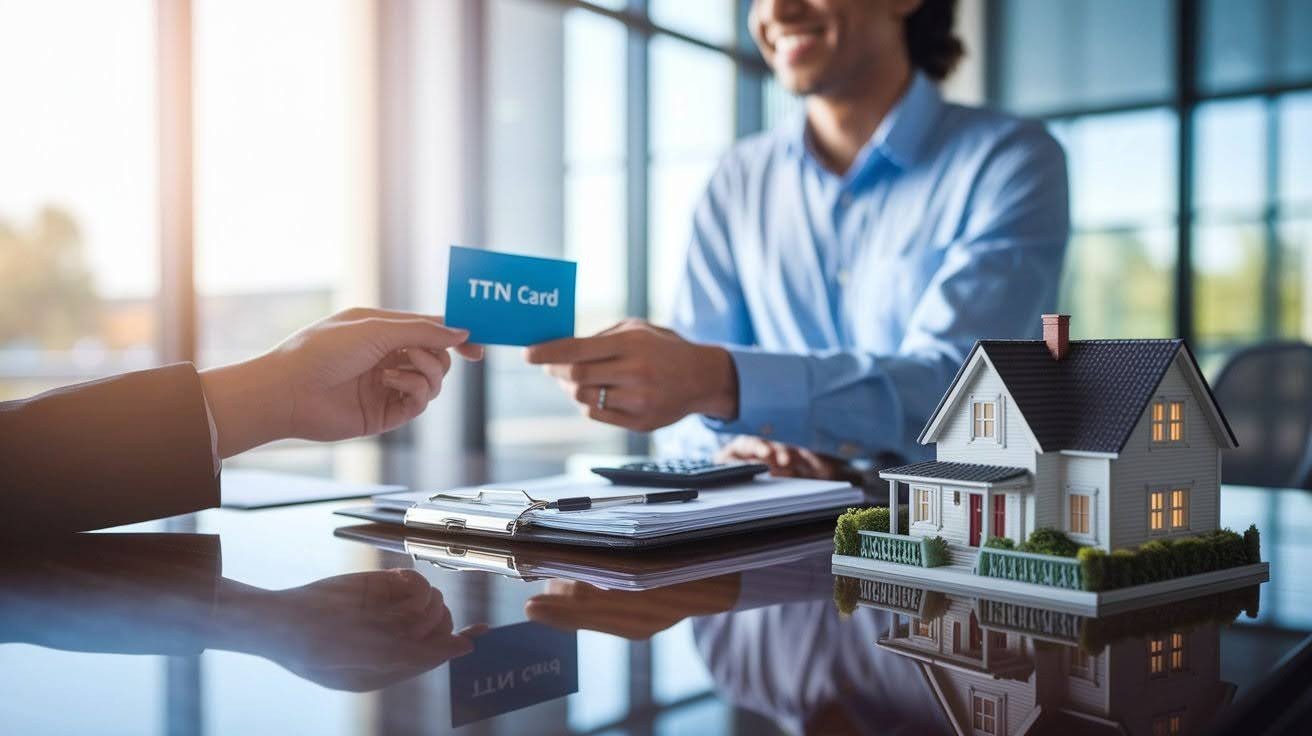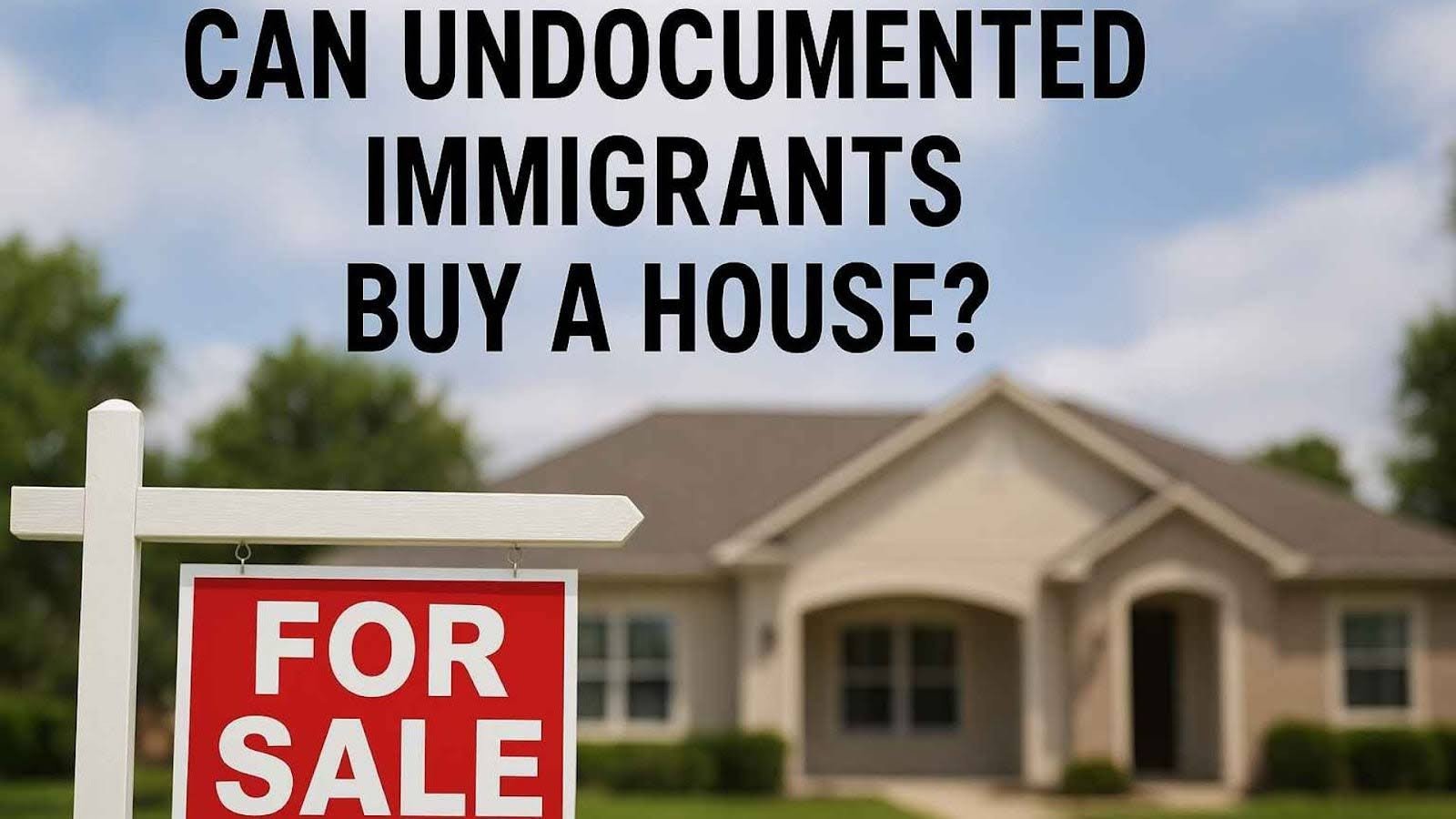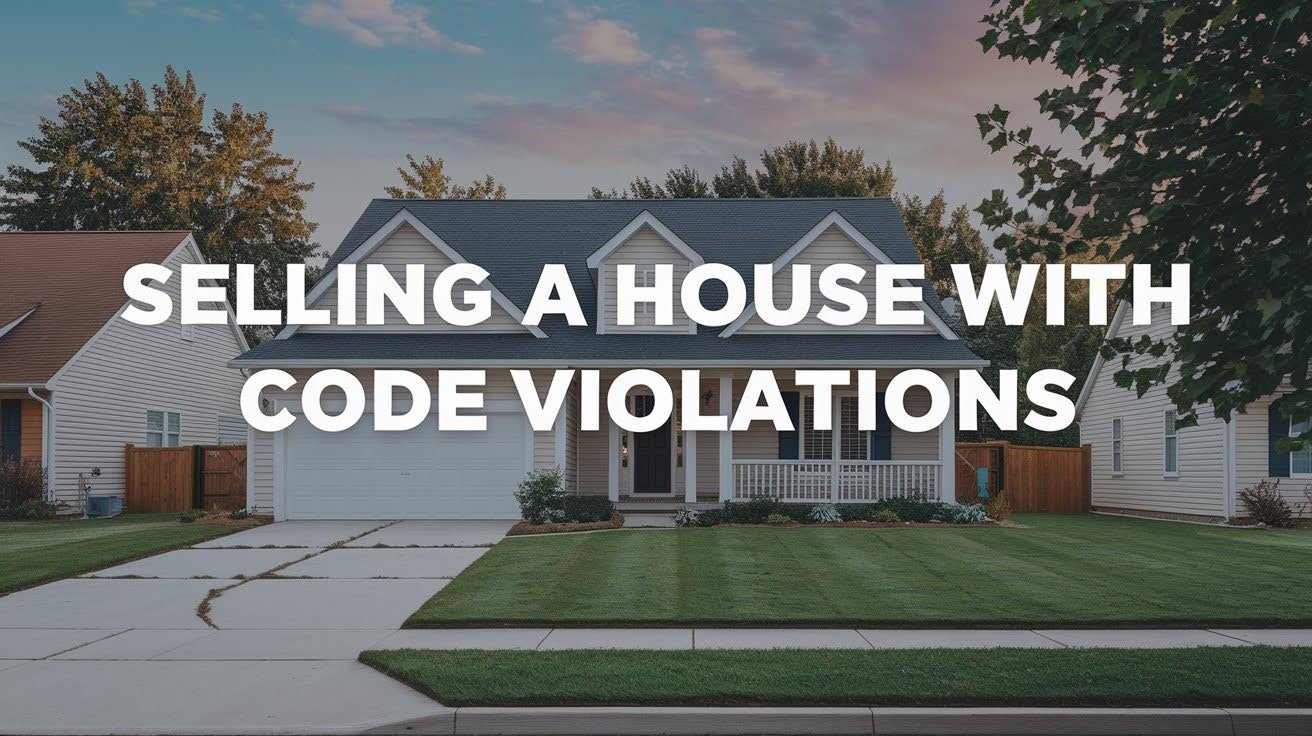Home ownership has, for many families, meant security and stability, the prospect of a better future. You might think you need legal status to buy a home, but you don’t always. As of 2022, more than 3.4 million undocumented immigrants own homes in the U.S.
The first thing to know is that you can buy property in America regardless of your immigration status. The federal government doesn’t prohibit non-citizens from buying U.S. homes. But the question is not who owns it, but who pays for it.
This guide will show you exactly how undocumented immigrants can buy a house, what financing options exist, what it takes to buy a home, the legal background, the practical requirements, and some obstacles to be aware of along the way.
Can Undocumented Immigrants Buy a House in the United States?
Yes, undocumented immigrants can legally buy a house in the United States. No federal law stops you from owning property based on your immigration status. The government doesn’t require citizenship to buy or own real estate.
The hard part isn’t about legal ownership, it’s about getting the money to buy. According to 2014 data, about 31% of undocumented immigrants owned their homes. Many people face this same challenge, and there are real solutions available.
Your immigration status and property rights are two separate things under U.S. law. This means you have the same right to own a home as anyone else. The question is how you’ll finance it.
Why Undocumented Immigrants Can Own Property in the US?
State property laws let any person own real estate. When you buy a house, the local recording office doesn’t ask for proof of citizenship. They simply record your name on the deed.
Foreign nationals from other countries buy U.S. property all the time. Investors from China, Canada, Mexico, and dozens of other countries own homes and buildings here. The system treats property ownership as separate from immigration matters.
Your legal status affects your ability to get a mortgage, but it doesn’t stop you from holding a title. Once you own the property, it’s yours. You can sell it, rent it, or pass it to your children.
The Main Challenge: Financing vs. Ownership
Understanding the difference between owning and financing a home is key to your success.
You have the legal right to own property, but most banks won’t give you a traditional mortgage without a Social Security Number. This creates a gap between what you’re allowed to do and what you can actually do. However, two real paths exist for buying a home.
The first option is paying cash for the entire property. The second is getting an ITIN mortgage from lenders who work with undocumented buyers. Each path has its own requirements and trade-offs.
| Factor | Cash Purchase | ITIN Mortgage |
| Down Payment | 100% of the purchase price | 15-30% (typically 20-25%) |
| Credit Check | Not required | Required (alternative credit accepted) |
| Interest Rate | N/A | 7-9% (higher than conventional) |
| Approval Process | Simple and fast | 4-8 weeks, detailed review |
| Documentation | Minimal (ID and funds proof) | Extensive (tax returns, pay stubs, ITIN) |
| Lender Options | Any seller accepts cash | Limited to ITIN-friendly lenders |
| Monthly Payments | None | Required for 15-30 years |
| Best For | Buyers with significant savings | Buyers with a steady income and tax history |
How Can an Undocumented Immigrant Buy a House?
You have two main options when you want to buy a home without legal status. Each method works, but they fit different situations. Your choice depends on how much money you have saved and whether you’ve filed taxes.
Some people save for years to buy with cash. Others build a tax history to qualify for an ITIN mortgage. Both paths have helped thousands of families become homeowners.
The key is understanding what each option requires and being honest about what you can provide. Let’s break down both methods so you can see which one fits your situation.
Option 1: Cash Purchase

Buying with cash is the most direct way to become a homeowner. You save enough money to pay for the entire house at once. No bank needs to approve you, and no one checks your immigration status.
When you buy with cash, sellers often take your offer seriously. You can close the deal quickly, sometimes in just a few weeks. There’s no waiting for mortgage approval or worrying about interest rates.
The big challenge is saving enough money. If you’re looking at a $250,000 house, you need all $250,000 plus closing costs (usually 2-5% more). For many families, this takes years of saving, but it’s the surest path to homeownership.
Option 2: ITIN Mortgage

An Individual Taxpayer Identification Number (ITIN) is a tax ID that the IRS gives to people who need to file taxes but don’t have a Social Security Number. You use it to report your income and pay taxes to the government.
ITIN mortgages are home loans designed for people who file taxes using an ITIN instead of a Social Security Number. These lenders know you’re paying taxes and contributing to the economy. They’re willing to give you a loan based on your tax returns and work history.
Not all banks offer these loans, but many credit unions, community banks, and specialized lenders do. They look at your income, tax payments, and work stability instead of your immigration status.
Option 3: Preparing Your Finances

Start by reviewing your income and expenses to see how much you can save. Even small monthly contributions build up over time, bringing your home closer to reaching.
Track your bills, rent, and savings so you have a clear picture of your financial health. This helps you decide whether a cash purchase or an ITIN mortgage is better for you.
Set goals for your down payment or full cash amount. With consistent effort and planning, you’ll feel confident and ready when the right home comes along.
Option 4: Build Alternative Credit

Even without a Social Security Number, you can show lenders that you’re reliable. Start by paying rent, utilities, and phone bills on time.
Keep records of all payments for at least two years. These receipts act as proof of responsible financial behavior.
Over time, this alternative credit helps lenders trust you, increasing your chances of qualifying for an ITIN mortgage.
Option 5: Work With a Knowledgeable Agent

Finding a real estate agent experienced with undocumented buyers is key. They understand the unique challenges you may face.
A good agent guides you through paperwork, helps you find ITIN-friendly lenders, and can negotiate better terms.
Having the right support makes the homebuying process smoother, faster, and less stressful, so you feel confident every step of the way.
Requirements to Buy a House as an Undocumented Immigrant
Getting ready to buy a house means gathering the right paperwork and meeting specific standards. Lenders want to see that you can afford the payments and have a history of paying your bills on time.
You’ll need several types of documents that prove your identity, income, and financial responsibility. The exact requirements vary by lender, but most ask for similar things. Start collecting these documents months before you apply.
The good news is that many people in your situation have met these requirements successfully. With preparation and the right documents, you can show lenders that you’re a reliable borrower.
Getting an ITIN Number
You apply for an ITIN by filling out IRS Form W-7. The form asks for basic information about you and why you need the number. You must attach documents that prove your identity and foreign status, like a passport.
The IRS takes about 6 weeks to process your application and send you the ITIN. You can apply by mail or visit an IRS-authorized Acceptance Agent who can verify your documents and submit everything for you.
The form is available in Spanish and many other languages. You can also include your spouse and children on the same application. Once you have your ITIN, it’s yours to use for life as long as you file taxes at least once every three years.
ITIN Mortgage Requirements
To qualify for an ITIN mortgage, you need a valid ITIN that’s active and not expired. You must show two years of tax returns filed under the same ITIN number. These returns prove you have e steady income and pay your taxes.
Lenders want proof of stable income through pay stubs and bank statements. They also look for at least two years of work history in the same job or industry. This shows you can keep earning money to make your payments.
Your down payment will be higher than regular mortgages, usually between 15% and 30% of the home price. Most lenders ask for 20-25%. Also expect higher interest rates, typically 7-9% compared to 4-6.5% for conventional loans. These rates reflect the extra risk lenders take.
Additional Documentation
You’ll need a government ID, usually a foreign passport from your home country. Some lenders also accept consular IDs. This proves who you are and helps establish your identity for the purchase.
Proof of income means recent pay stubs (usually last 2-3 months) and bank statements showing regular deposits. If you’re self-employed, you’ll need business records. Lenders want to see money coming in consistently.
Since you may not have a U.S. credit score, lenders accept alternative credit history. This includes utility bills in your name, rent receipts, and payment records for phone or car insurance. You’ll also need enough reserve funds money save.
Common Obstacles for Undocumented Homebuyers
Understanding what makes it harder to buy a house helps you prepare better and avoid surprises.
Financial Challenges
The down payment requirement is much higher for ITIN mortgages. While regular buyers might put down 3-5%, you’ll need 15-30%. On a $200,000 house, that’s $30,000 to $60,000 instead of $6,000 to $10,000.
Interest rates are also 1-2 percentage points higher. If regular buyers pay 6%, you might pay 7.5-8%. Over 30 years, this costs tens of thousands more. Very few lenders offer ITIN mortgages, so your choices are limited.
Here’s a real example: A $200,000 house with a 20% down payment ($40,000) leaves a $160,000 mortgage. At 7.5% interest for 30 years, your monthly payment is about $1,118. A regular buyer with a 6% rate would pay $959, that’s $159 less each month or about $57,000 less over the life of the loan.
Documentation Barriers
Without a Social Security Number, many parts of buying a house become more complex. Banks use Social Security Numbers to check credit history, so you need to build alternative credit records.
Most undocumented immigrants have limited or no U.S. credit history. Lenders can’t pull a credit report on you the normal way. You have to manually prove you pay bills on time using receipts and statements.
Getting a state ID or driver’s license is difficult or impossible in many states. Your employer may have trouble verifying your work history in the way lenders want. These small barriers add up and require creative solutions.
Insurance and Registration Issues
Home insurance companies sometimes ask for a Social Security Number, though many accept an ITIN. You need to shop around for insurers who understand your situation. Insurance is required if you have a mortgage.
Recording your property title works fine without a Social Security Number. You can use your ITIN or just your name. Some title companies are unfamiliar with this process and may need extra explanation.
Property taxes work the same for everyone, but you’ll need to understand how to file them properly. Recording the deed in your name at the county office is legal and straightforward, though clerks in some counties may not see this situation often.
Tips for Undocumented Immigrants Who Want to Buy a House
Here’s practical advice to increase your chances of buying a home successfully:
- Start building alternative credit now: Pay utilities, rent, and phone bills in your name. Keep all receipts and statements for at least two years. This creates proof of responsible payment history.
- File taxes consistently with your ITIN: File every year for at least two years before applying for a mortgage. Keep copies of all returns and proof of filing. This is your most important document.
- Save aggressively for your down payment: Set up a separate savings account and deposit money regularly. Aim for at least 20-25% of your target home price. The more you save, the better your loan terms.
- Research ITIN-friendly lenders early: Not all lenders offer these loans. Start calling credit unions and community banks in your area. Ask specifically about their ITIN mortgage programs before applying.
- Get help from a bilingual real estate agent: Find an agent who has helped undocumented buyers before. They know which lenders to use and what problems to avoid. Their experience saves you time and mistakes.
- Consider buying in immigrant-friendly states: Some states make it easier to get a driver’s license and ID. Others have more lenders familiar with ITIN mortgages. Location affects your options.
- Consult an immigration attorney before buying: A lawyer can explain how buying a house might affect any future immigration applications. They can also help with estate planning, so your family keeps the house if something happens to you.
Conclusion
Can undocumented immigrants buy a house?” Yes, you can legally buy and own a home in the United States regardless of your immigration status. Under federal law, you are not prohibited from becoming a homeowner.
The two options are: pay with cash, which costs more and is simpler, or get a mortgage using an ITIN (tax identification number). ITIN mortgages allow you to buy sooner, but usually require a tax history, larger down payments, and higher interest rates.
Most of your problems will be financial, not ownership-related. The best way to resolve legal matters is to hire a skilled immigration attorney, and a skilled real estate attorney will guide you through the purchasing process.
Frequently Asked Questions
Can undocumented immigrants buy a house without a Social Security Number?
Yes, you can buy a house using an ITIN instead of a Social Security Number. The ITIN lets you file taxes and apply for specialized mortgages. Many lenders accept ITINs for home purchases.
Do I need a green card to buy property in the US?
No, you don’t need a green card or any legal status to buy property. Property ownership is separate from immigration status under U.S. law. Anyone can legally own real estate here.
What is the minimum down payment for an ITIN mortgage?
Most ITIN mortgage lenders require 15-30% down, with 20-25% being typical. This is higher than conventional mortgages, which can require as little as 3-5% down for qualified buyers.
Can undocumented immigrants buy a house and then get deported?
Yes, you can still own your house if you’re deported. The property remains yours legally. However, managing it from another country is difficult, so estate planning with an attorney is important.
Which banks offer mortgages to undocumented immigrants?
Most major banks don’t offer ITIN mortgages. Look at credit unions, community banks, and specialized lenders instead. Banks like Citibank and some local credit unions have ITIN mortgage programs in certain areas.





